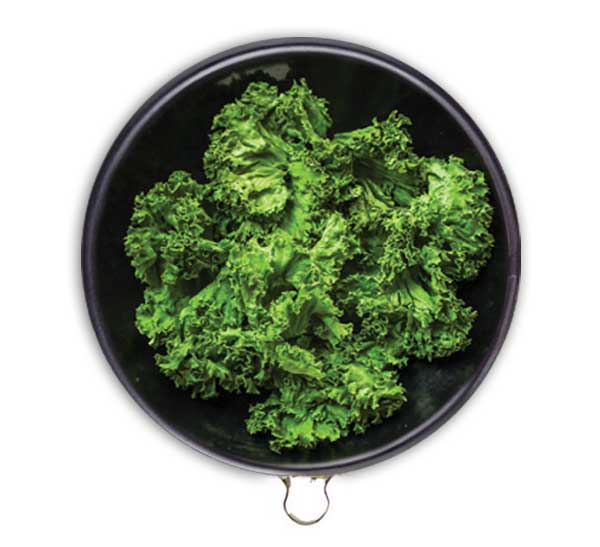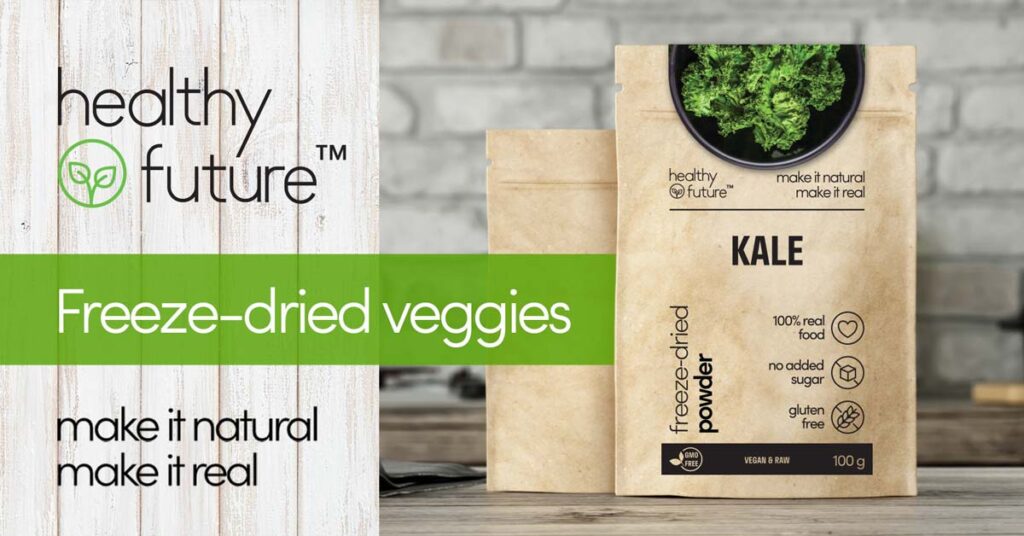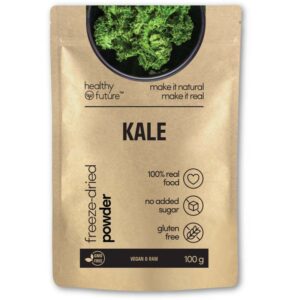
Freeze dried kale
100% natural, vegan and raw, gluten free, no added sugar or sulphur, no preservatives, GMO free
Kale is one of the most valuable leafy vegetables and is regarded as a superfood. Kale is a vegetable of which nutritional value and health properties have been appreciated since antiquity. It has many positive properties, and its anti-cancer effect seems to be the most valuable.
In the Aggregate Nutrient Density Index (ANDI) scale created by Dr Joel Fuhrman, assessing the nutritional value to caloric value of a product, kale took the honourable first place. This means that in a relatively small amount of calories, kale provides many vitamins, minerals, antioxidants and other health-promoting biologically active substances.
Why should we eat kale?
With only bell peppers and parsley having more, kale is the next edible treasure source of Vitamin C amongst the vegetables! It also contains more calcium than milk! Kale is an excellent source of alpha-linoleic acid (ALA), an omega-3 fatty acid essential for the regular functioning of the brain.
Kale has very few calories, so it is perfect for people who want to reduce weight and at the same time provide the body with many nutrients it needs for regular functioning. Freeze-dried kale is used in the production of dietary supplements, including substances that cleanse the body and regulate the functioning of the intestines.
Kale contains ample amounts of protein, fibre, vitamins, especially C, A and K, and minerals: calcium, magnesium, iron and potassium. It is also a rich source of flavonols with anti-inflammatory and antioxidant properties. Sulforaphane contained in kale is one of the strongest antioxidants having a strong anti-cancer effect.
Kale participates in inhibiting the development of atherosclerosis and cancer. The compounds present in its leaves prevent DNA damage, regulate blood pressure, protect blood vessels, improve the lipid profile (cholesterol level), reduce the likelihood of diabetes and obesity.
The nutrients contained in kale can effectively influence your overall well-being and even help treat depression. Kale is also excellent in the prevention and treatment of osteoporosis – it contains a significant content of easily digestible calcium. Lutein contained in the leaves reduces the likelihood of eye diseases.
Kale - health properties
Kale is:
a low-calorie vegetable with a low glycaemic index;
rich in protein and fibre;
an excellent source of vitamin K;
a valuable source of sulforaphane, a compound with strong anti-cancer and anti-inflammatory properties;
an excellent source of alpha-linoleic acid (ALA, omega 3);
a source of vitamins: C, A, K, B1, B2, B3 (PP), B6, B9 (folic acid);
a source of minerals: calcium, iron, magnesium, phosphorus, potassium, sodium, zinc, copper, manganese;
called “new beef” because of its high iron content;
recommended for pregnant women.
Freeze-dried kale nutritional values
Kale:
- contains ample amounts of minerals: potassium, calcium, magnesium and iron;
- supports bones, protects against osteoporosis;
- protects against heart disease and strengthens blood vessels;
- regulates blood clotting;
- helps to maintain normal blood pressure and cholesterol levels;
- protects against type 2 diabetes;
- has very strong anti-cancer and anti-inflammatory properties;
- supports the production of red blood cells, which reduces the risk of anaemia;
- contains large amounts of vitamin K, vitamin C, provitamin A;
- contains more calcium than milk;
- contains more vitamin C than oranges and four times more than spinach;
- contains more vitamin A than any green vegetables;
- protects the nervous system, prevents depression and neurodegenerative diseases;
- protects the eyes and improves eyesight;
- supports the body’s immunity and regulates metabolism;
- improves the condition of hair, skin and nails;
- contains polyphenols that are beneficial for allergy sufferers.

Antioxidant and anti-inflammatory effect
Kale is a leafy green veggie containing compounds with very strong antioxidant and anti-inflammatory properties. It contains, among others, vitamin C, E, sulforaphane, quercetin, beta-carotene, lutein and zeaxanthin.
The antioxidants contained in kale reduce free radicals, slow down the aging process, participate in the regeneration of previously oxidized vitamins and have anti-inflammatory and antiviral properties. In addition, they counteract allergies, inhibit the development of cancer cells, protect blood vessels, improve the lipid profile, reduce the likelihood of type II diabetes and obesity.
Vitamin C fights free radicals formed both during the preparation of food and as a result of metabolic processes in the body, helps in the synthesis of collagen and also strengthens the immune system. Lutein and zeaxanthin, in turn, help reduce the likelihood of eye disease.
Provitamin A
Kale is a rich source of beta-carotene, i.e. provitamin A, which is converted into vitamin A in our body. This compound controls the level of free radicals in the body, stimulates the production of collagen fibres, lowers the level of “bad” LDL cholesterol, and has a positive effect on the immune system. In addition, it supports the proper functioning of the eye and has a beneficial effect on the skin, hair and nails.
Kale and anti-inflammatory effect
Sulforaphane is a very strong antioxidant contained in kale. It has a strong anti-cancer effect – you can read more about it later in this article. Sulforaphane has also a strong anti-inflammatory effect. It activates a type of protein that is believed to be a longevity factor.
Equally strong anti-inflammatory properties are shown by quercetin, which prevents the formation of atherosclerotic plaque.
Kale and vitamin K
Kale is a very good source of vitamin K. This vitamin has a huge impact on the proper functioning of the blood coagulation system, reduces the risk of osteoporosis, and is recommended in the prevention of ischemic heart disease.
Vitamin K also helps to deal with excessive bleeding during menstruation, so it is much appreciated by women struggling with heavy menstruation. According to the latest research, vitamin K also has an anti-cancer effect.
Vitamin K deficiency may cause poor blood clotting, which may translate into internal and external haemorrhages, and problems with wound healing. Moreover, according to experts, its vitamin K deficiency may be the cause of an increased risk of cancer development.
Protection for nervous system
Kale protects the nervous system thanks to the content of B vitamins. It is also used as one of the green vegetables in the famous MIND diet. Its aim is to reduce the risk of neurodegenerative diseases, such as Alzheimer‘s disease, and to support the work of the nervous system on a daily basis.
We pick only the finest, wholesome kale and freeze-dry it, in order to preserve their original flavour and nutritional content.
Kale and depression
Many sources indicate that the nutrients contained in kale can effectively affect your overall well-being and even help treat depression. The effectiveness of kale’s influence on our mood is confirmed by more and more studies. First of all, it improves the life of millions of beneficial microorganisms that live in our body and ensure its healthy functioning.
Moreover, kale is filled with omega-3 fatty acids, which can be very helpful in fighting depression symptoms. In addition, the combination of protein, iron, folic acid and vitamin B6 contained in kale activates the production of happiness hormones – serotonin and dopamine.
Alpha-linoleic acid (ALA)
Kale is an excellent source of Alpha Linoleic Acid (ALA). It is a type of omega-3 fatty acid. It is essential for the regular functioning of the brain and the structure of cell membranes. It also reduces the risk of type 2 diabetes and has a positive effect on functioning of the heart.
Kale and anti-cancer properties
Anti-cancer potential of the substances contained in kale makes this vegetable a superfood. Frequent consumption of kale may lower the risk of developing, e.g. cancer of the stomach, colon, lung, prostate, bladder, breast and endometrium.
Sulforaphane – sulphur compounds
Sulphur compounds are extremely valuable in anti-cancer prophylaxis. The anti-cancer properties of sulforaphane contained in kale (a sulphur-rich organic compound, a very strong antioxidant) have been confirmed by scientific research. It has been proven that sulforaphane can protect, among others, against prostate cancer, lung cancer and colon cancer.
Sulforaphane is the most valuable anti-cancer substance in kale. The anti-tumour properties of sulforaphane result from the induction of detoxification enzymes of certain carcinogens, induction of apoptosis, also differentiation and inhibition of the cell cycle and inflammatory processes.
In order for this compound to be active, an enzyme called myrosinase, released from plant cells during their mechanical damage due to the process of chewing, chopping or crushing, etc., is necessary. Unfortunately, this enzyme is sensitive to prolonged exposure to high temperatures. For this reason, in order to use the anti-cancer potential of kale, it is recommended to eat kale raw, for example in the form of a smoothie.
Vitamin K
The vitamin K present in kale is also an excellent protective shield against the appearance of certain neoplastic changes, especially liver cancer, colon cancer, gall bladder cancer, breast cancer and ovaries cancer.
Indoles
In addition, kale contains indoles that inhibit the secretion of active oestrogens, and thus also prevents breast cancer.
Other antioxidants
Other antioxidants in this vegetable, such as beta carotene, lutein and zeaxanthin, have a similar effect. They inhibit harmful oxidative effects, thanks to which they reduce inflammation and significantly reduce the incidence of cancers such as mouth cancer, oesophagus cancer, larynx cancer and bladder cancer.
Thermal treatment of kale
The anti-cancer compounds in kale are quite sensitive to high temperatures. Therefore, in order for kale to retain as much of its anti-cancer properties as possible, it should be eaten raw, blanched or cooked like broccoli, i.e. steamed for a maximum of 3-4 minutes.
Heart and cardiovascular system protection
Kale is recommended as an excellent dietary component in the prevention of cardiovascular diseases (including atherosclerosis, stroke, heart attack). The ingredients present in kale have a beneficial effect on cholesterol levels, the patency and elasticity of blood vessels and blood pressure.
The cardiovascular system is supported mainly by the elements: potassium and calcium. They help lower blood pressure – potassium makes blood vessels more open, blood flows more freely; calcium, in turn, plays an important role in proper blood clotting and pumping blood to all body tissues.
Vitamin C contained in kale, in addition to its antioxidant properties, strengthens the immune system and supports the prevention of atherosclerosis – reduces the oxidation of “bad” LDL cholesterol, and strengthens and seals blood vessels.
Eye support
The ingredients contained in kale have a huge impact on the proper functioning of eyes and vision processes. First of all, this vegetable is an excellent source of beta-carotene, from which the body produces vitamin A. Vitamin A is a compound that participates in the process of vision, it helps to prevent dry eye syndrome and night blindness, which is manifested by impaired vision after twilight. In addition, it reduces the risk of macula development (yellow spot disease).
Other strong antioxidants contained in kale – zeaxanthin and lutein, which are components of the macular pigment and prevent macular degeneration, retinitis pigmentosa and cataract, also have a positive effect on eye health. Lutein is a kind of filter that absorbs UV radiation that is harmful to the eye. Both compounds, lutein and zeaxanthin, help protect the retina from free radical damage and the damaging effects of excess light energy / sunlight.
Protection against gastric and duodenal ulcers
Kale protects against gastric and duodenal ulcers. This effect is related to sulforaphane, a sulphur-containing very strong antioxidant. This compound has a bacteriostatic effect and contributes to the destruction of the gastritis and ulcer-causing bacteria Helicobacter pylori.
Kale and osteoporosis
Kale is often mentioned as one of the foods especially beneficial for bone health, because it contains large amounts of calcium and vitamin K. Calcium builds strong bones, and vitamin K improves the absorption of this element, as well as reduction in the amount of calcium excreted in the urine.
For this reason, a diet rich in both of these compounds has a positive effect on the health of the skeletal system and protects against osteoporosis. Consuming kale is therefore very important for people who avoid meat and dairy products in their diets.
Chlorophyll
Chlorophyll contained in kale – a green dye, called the blood of plants, has an antioxidant effect and supports the body’s cleansing processes of toxins. Chlorophyll forms strong connections with some toxic compounds (including some carcinogens), thanks to which less harmful compounds reach the body’s tissues.
Kale and weight-loss
Kale has few calories, contains a small amount of fat, so it is perfect for people who want to lose weight and at the same time provide the body with all the nutrients it needs for regular functioning.
In addition, it contains fibre that ensures a feeling of fulness and supports the elimination of toxins from the body.
Kale and diabetes
Kale is not only low in calories, but also has a low glycaemic index. This means that its consumption does not cause a rapid increase in blood glucose levels. This allows it to be used in the diet of people suffering from diabetes and insulin resistance.
In addition, the recommendations of healthy eating clearly state that most people who want to protect themselves against the development of civilization diseases should use a diet with a low glycaemic index.
Due to the presence of many active compounds in kale, it can improve blood sugar control and prevent cardiovascular problems. The presence of sulforaphane, fatty acids, antioxidants, as well as fibre and numerous vitamins and minerals may be of key importance.
Kale and pregnancy
Kale is filled with essential health nutrients, which makes it the best pre-natal food. It is considered one of the best foods for most expectant mothers.
Iron supports the formation of red blood cells in the bone marrow and the transport of oxygen in the cells – this helps to avoid anaemia. Folic acid is extremely important both before and during pregnancy for the proper development of the foetus, and potassium prevents arterial hypertension.
In the case of mothers who do not eat animal products, including dairy products and eggs, due to the significant amount of calcium, vitamin C and iron, kale supplements the deficiencies caused by excluding milk and its products from the diet.
Contraindications to eating kale
Cruciferous vegetables, including kale, may cause flatulence/abdominal gas, so they may not be suitable for people on an easily digestible diet due to digestive system diseases. Cooked kale is less bloating.
Kale and thyroid
Some sources say that kale, like other cruciferous vegetables, is not recommended for people suffering from thyroid disease. This is due to the presence of goitrogens, i.e. chemicals that can affect the metabolism of iodine and contribute to lowering iodine levels in the body. This may lead to a disturbance in the synthesis of thyroid hormones and an enlargement of the thyroid gland.
Fortunately, the adverse effects of goitrogens can be limited to some extent by cooking kale without a lid (goitrogens are released due to a high temperatures).
Kale and kidneys – oxalates
Kale is also not recommended for people suffering from kidney stones (oxalate), because it contains large amounts of oxalates that are difficult to dissolve in water.
In combination with calcium, oxalic acid forms insoluble and non-digestible particles, which may, among other things, reduce the amount of calcium in the bones. In addition, oxalates can also build up in the urinary tract and kidneys, causing kidney stones. Their excess can lead to decreased sperm viability, arthritis, and even heart problems.
The oxalic acid content of kale can be lowered by thermal treatment, e.g. cooking.
Freeze-dried kale in the kitchen
The possibilities for using kale in everyday meals are endless. Moreover, kale dishes can be extremely easy to prepare. It can be eaten raw (as an ingredient in salads or a base for green smoothies and cocktails) and after heat treatment (for soups, sauces and stews).
Kale is a great addition to smoothies and cocktails, adding not only great taste but also nutritional value. The kale will enrich the taste of salads and vegetable dishes with rice, groats or noodles. Kale can be prepared just like spinach. From freeze-dried kale powder, we can prepare, among others, soup, stew, smoothie or a cocktail.
If we want to take advantage of the anti-cancer effect of kale, it is worth eating it raw, for example in the form of cocktails, smoothies or salads – heat treatment weakens its anti-cancer properties. If for some reason you cannot eat raw kale, it is best to steam it for no more than 3-4 minutes.
If you don’t have fresh kale on hand, freeze dried kale is a good option, as the kale has not been exposed to high temperatures during the freeze-drying process.
Very popular, healthy and easy-to-prepare is kale green smoothie. You can add your favourite fruit to the drink to break the rather sharp cabbage flavour of raw kale leaves. You can find a recipe for a sample smoothie here.
Try our freeze dried kale
-
Freeze Dried Kale Powder
£8.50 – £41.00 Select options This product has multiple variants. The options may be chosen on the product pageRated 0 out of 5
Guilt-free food for taste!


